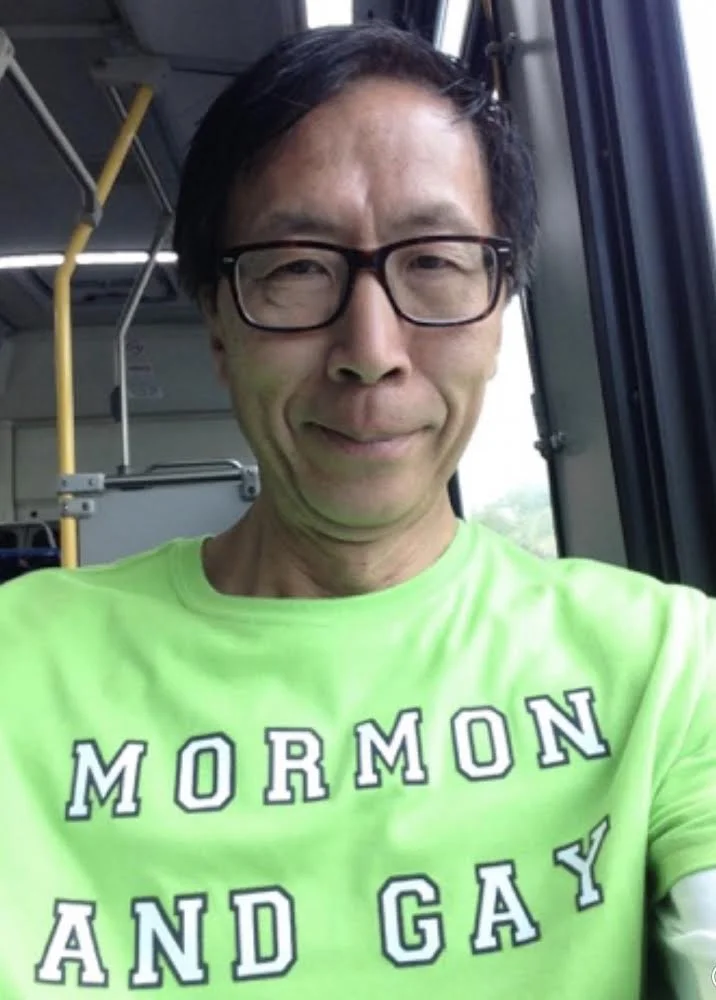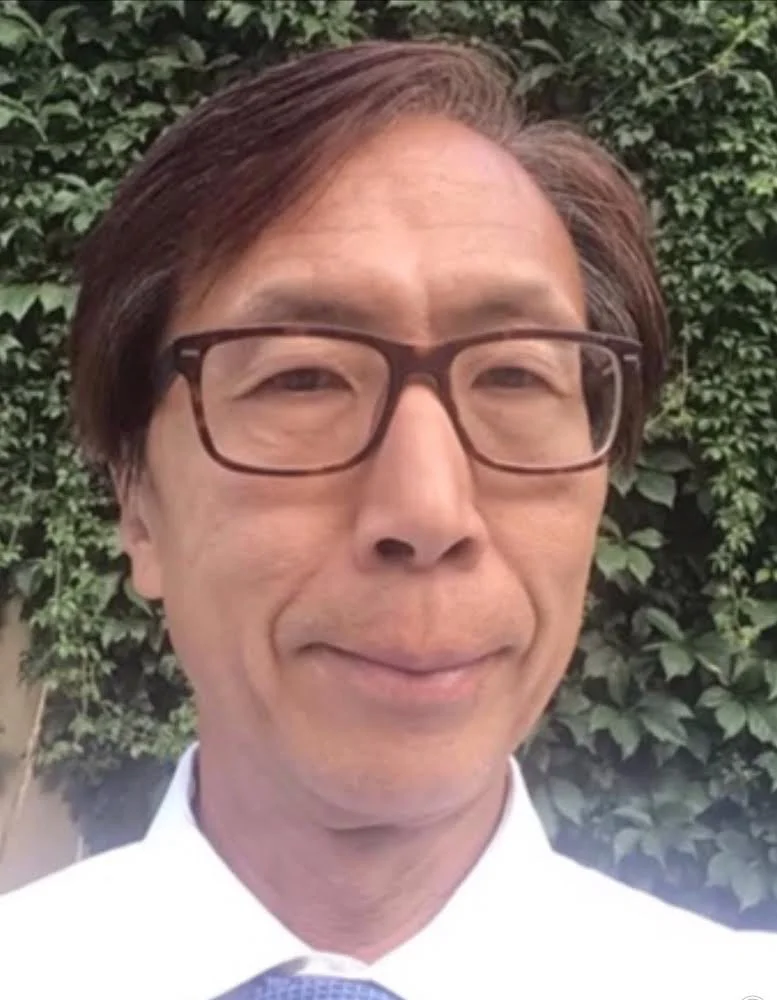Jerry Chong from Calgary, Alberta has been an active member of the Church of Jesus Christ of Latter-Day Saints for 17 years. He is the first to admit that living as a single, celibate, gay man in the Church has not been easy, but that it is worth it.
“What are the chances that two missionaries would find someone at home midday on a Tuesday willing to let you in and teach a full first lesson?” Jerry muses. But at the age of 42, Jerry noticed two young men in suits knocking doors in his neighborhood. They introduced themselves and said they were there to share a good message. Jerry had had no previous encounters with missionaries or the church. But he invited them in and that is where his journey began. The missionaries invited him to church and gave him the address to the chapel, but no directions on how to get there. Jerry attempted to go, but knew it was going to be too hard to find the building and decided to go back home. Jerry laughs, remembering, “If someone you just met told you that a complete stranger would show up on your doorstep and offer you a ride to church the next week, would you get in their car?”
Jerry’s first church experience was “clumsy and awkward, but at the same time, it felt comfortable,” he says. Jerry met with the elders and attended church weekly, and was invited to be baptized at least 45 times over the next couple of months. His turning point was when he truly recognized the spirit for the first time during a baptismal service and felt the love of his Savior and Heavenly Father in a personal way. Jerry was ready to commit for the long haul.
After his baptismal interview, Jerry came out to the missionaries and told them he was gay. They arranged a special meeting with the mission president during which the mission president asked Jerry, “Who molested you to turn you gay?” Jerry was horrified by this line of questioning and quickly explained he was born this way and had known since early childhood he was different. Jerry said he easily could have called off his baptism and thrown out his interest in the gospel. But his bishop reassured him that he would protect him and be his shepherd, and that what the mission president said wasn’t any part the gospel of Jesus Christ, but his own opinion.
After Jerry was baptized, he asked his bishop if there was an LGBTQ member who had navigated their way through the gospel. The bishop admitted there were some, but none willing to come forward to talk with him. Jerry has since made this his mission: to help ease the path for LGBTQ people of all ages seeking to find their place and purpose in the gospel.
In 2005, Canada passed the same-sex marriage bill. This was the subject for church nationwide in Canada. It was a tough day at church as sacrament speakers and teachers shared messages from the first presidency about how wrong gay marriage was. Jerry spent most of those meetings quietly weeping. During the Elders Quorum lesson, the instructor asked the class, “Why is it that the vocal minority is being heard louder than the quiet majority when it comes to the same sex marriage bill?” Jerry says he felt an impression to speak up. He took a deep breath, raised his hand and said, “I can provide an answer. In the last year, some of you have gotten to know me. Some of you have come to love me. There is more I want you to know about me. I’m gay. I love the gospel. It’s challenging to be part of this church, and it’s been a tough day so far. I’ve been crying all morning without letting anyone see it. Those who are choosing to be legally married by this new law have put in the same amount of thought as you have. We are committing to love and support another person. We want to be a family. We want to be parents.” Jerry recalls he had their undivided attention, and many thanked him afterwards for speaking up and helping them understand the new law. After he got home from church, a young couple called and asked Jerry if they could come over and ask a few more questions. They wanted to know what it’s like to be gay in the church, and what are the hardest things that people sometimes say. They remain Jerry’s close friends to this day.
For the most part since, Jerry said his experiences at church with bishops and stake presidents (many whom he considers friends) have been positive as they have supported him as he’s served in leadership and missionary service callings and currently as a temple ordinance worker. But during his first temple recommend interview in 2005 with his stake president, Jerry came out to him. The leader replied, “You can’t be gay; I know you.” Jerry replied he’d only shared the part of him he felt the stake president could understand. The stake president thanked Jerry for his honesty and signed his recommend.
The November 2015 exclusion policy was a time marker when Jerry felt he needed to speak up and become an advocate within the church. He reached out to his stake president about how hurtful the policy was for LGBTQ individuals and their families. The stake presidency invited him to share his thoughts with them shortly after.
In the last six years, Jerry has found great success in meeting with leaders throughout Calgary, including six of the eight stake presidencies and over 35 bishops in his area. He has conducted LGBTQ Inclusion and Sensitivity training for bishops. Only one stake president has said he wasn’t interested in having these discussions, claiming that “there were no gay members in his stake.”
Jerry says, “Many bishops I speak with are concerned about saying the wrong things because they have not had any experiences counseling LGBTQ members in their ward. They truly want to get it right the first time. The goal is to help them understand how they can support their ward members in feeling included and safe in the gospel. They value my input and my willingness to be vulnerable.” Jerry typically shares his own story and then personal accounts of other families, making it real for leaders to understand. He tries to balance the positive and negative experiences that members face.
Jerry recognizes the tremendous impact of mothers who speak up for their LGBTQ children and the influence of the ward Relief Society presidencies in helping these leadership conversations come together. He feels the grassroots approach has made a real difference in some geographical areas in the church.
Jerry has also been asked hard questions in his leadership trainings; the toughest being what advice would he give to a 12 or 14-year-old confronted with the idea that in order to be faithful and true, they must live a celibate life. Jerry says, “What we are asking LGBTQ members to do and sacrifice is not asked of any other groups or individuals in the church. I realize there are no simple answers to each person's situation. All we can do is try every day to cope and discover what Heavenly Father has in store for us.” Jerry continues, “Humans were never meant to live alone. Giving up any possibility of finding someone to truly say I love you to. Accepting the destiny that you will be living alone for the rest of your life. Not everyone will marry in this life, but you have taken away any possibility of companionship.”
Jerry first came out at the age of 20, but says he still comes out to new people 40 years later. He still takes a deep breath each time, and says he only opens up to them when he feels safe and that he can be truly honest with the people around him. “It’s a matter of learning to be comfortable in your own skin. For some, this is a long, difficult process. Self-esteem and self-confidence take time to develop.” Jerry feels fortunate to have a positive experience each time he comes out and realizes this is not the same for everyone.
Jerry is often asked how he can be a member of the church and still be true to himself. He replies, “I carry myself with dignity and understand the varying levels of acceptance in the Church… We receive constant reminders that we do not fit in. We stay silent, putting on a brave front, uneasy of how people will react, especially in a classroom setting. I have gone home many Sundays asking myself, ‘Is it worth it? Why do I continue to try?’ The answer is always because the Savior and Heavenly Father love me and I know it.”
Jerry recognizes that the church is not the safest place for everyone. He doesn’t hesitate to suggest taking a break from church if it is harming one’s mental wellness. He acknowledges that, “Remaining single, celibate, and obedient to the standards of the church has left me hollow at times. My motivation to be a LGBTQ advocate within the church is driven by the unbalanced requirements and judgments we face. No other group of people are asked to give up and sacrifice so much to be rewarded with the blessings of the gospel. The commentary and questions required of us before baptism is unfathomable for most to comprehend. Speaking up with our collective voices will make a difference in the pursuit of fairness and equality.”
Jerry feels we need to teach and re-teach members to be more kind, patient, empathetic and understanding with one another. “Heavenly Father loves all of His children more than we can comprehend. That we all have a place in the gospel. The love of the Saviour is what keeps me motivated to speak up and make a difference where I can.”


















